Leadership in Nursing: A Scenario-Based Essay on Medication Safety
VerifiedAdded on 2023/06/06
|9
|2340
|492
Essay
AI Summary
This essay critically reflects on the impact of medication errors on patient safety within a healthcare setting, emphasizing the crucial role of effective leadership. It explores the application of transformational leadership to implement a computerized medication administration system, highlighting the benefits of electronic medication systems in reducing errors and improving patient care. The essay uses Lewin's three-step model of change (unfreezing, changing, refreezing) to outline a plan for transitioning from a paper-based system, addressing potential resistance and emphasizing the significance of communication and stakeholder involvement. Comparing transformational and authoritarian leadership styles, the essay argues for transformational leadership's suitability in promoting change and achieving better patient outcomes. The analysis also considers potential barriers to change and stresses the importance of effective leadership in managing these challenges, ultimately concluding that leadership is essential for organizational success and patient well-being. The essay is supported by multiple references.
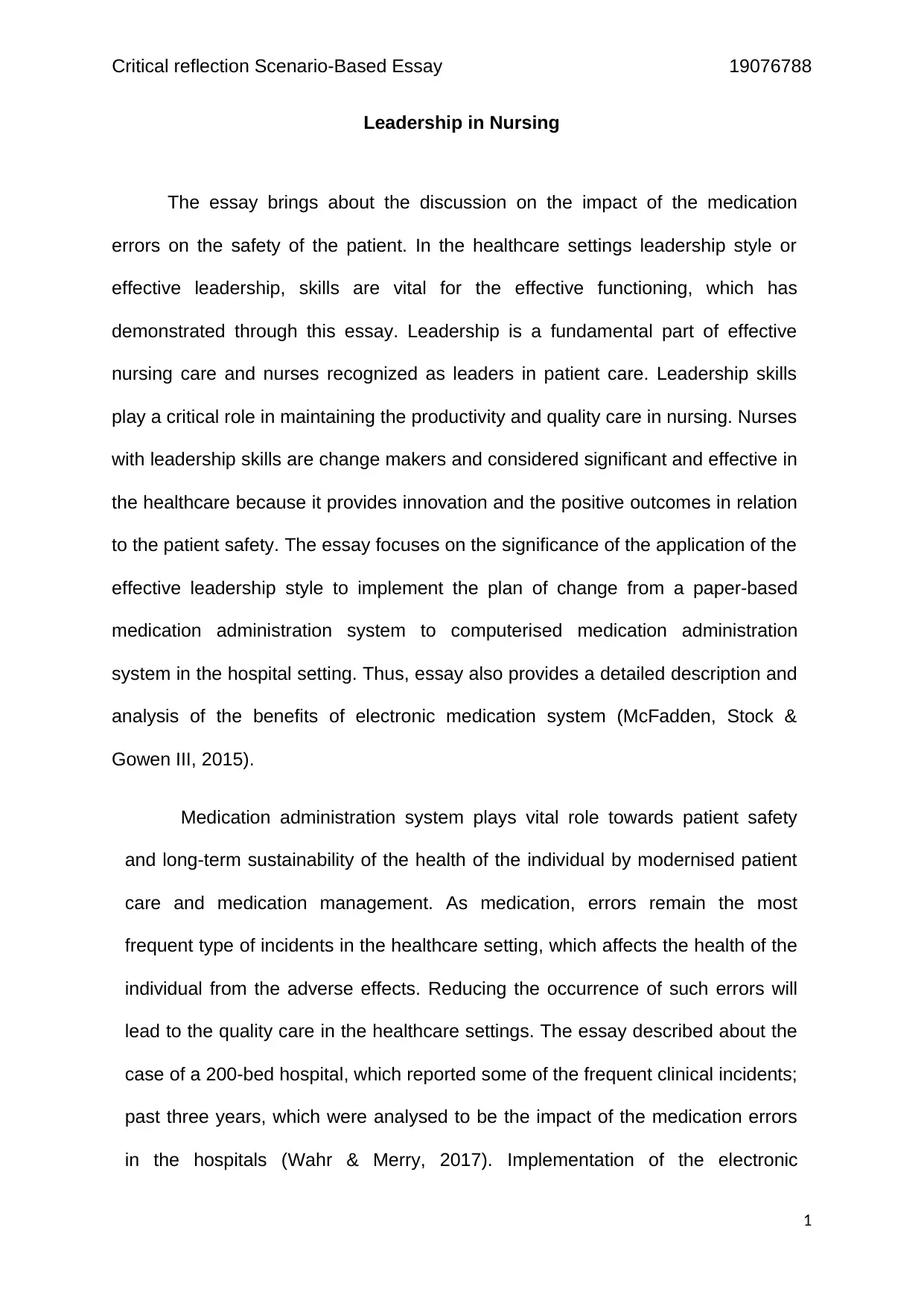
Critical reflection Scenario-Based Essay 19076788
Leadership in Nursing
The essay brings about the discussion on the impact of the medication
errors on the safety of the patient. In the healthcare settings leadership style or
effective leadership, skills are vital for the effective functioning, which has
demonstrated through this essay. Leadership is a fundamental part of effective
nursing care and nurses recognized as leaders in patient care. Leadership skills
play a critical role in maintaining the productivity and quality care in nursing. Nurses
with leadership skills are change makers and considered significant and effective in
the healthcare because it provides innovation and the positive outcomes in relation
to the patient safety. The essay focuses on the significance of the application of the
effective leadership style to implement the plan of change from a paper-based
medication administration system to computerised medication administration
system in the hospital setting. Thus, essay also provides a detailed description and
analysis of the benefits of electronic medication system (McFadden, Stock &
Gowen III, 2015).
Medication administration system plays vital role towards patient safety
and long-term sustainability of the health of the individual by modernised patient
care and medication management. As medication, errors remain the most
frequent type of incidents in the healthcare setting, which affects the health of the
individual from the adverse effects. Reducing the occurrence of such errors will
lead to the quality care in the healthcare settings. The essay described about the
case of a 200-bed hospital, which reported some of the frequent clinical incidents;
past three years, which were analysed to be the impact of the medication errors
in the hospitals (Wahr & Merry, 2017). Implementation of the electronic
1
Leadership in Nursing
The essay brings about the discussion on the impact of the medication
errors on the safety of the patient. In the healthcare settings leadership style or
effective leadership, skills are vital for the effective functioning, which has
demonstrated through this essay. Leadership is a fundamental part of effective
nursing care and nurses recognized as leaders in patient care. Leadership skills
play a critical role in maintaining the productivity and quality care in nursing. Nurses
with leadership skills are change makers and considered significant and effective in
the healthcare because it provides innovation and the positive outcomes in relation
to the patient safety. The essay focuses on the significance of the application of the
effective leadership style to implement the plan of change from a paper-based
medication administration system to computerised medication administration
system in the hospital setting. Thus, essay also provides a detailed description and
analysis of the benefits of electronic medication system (McFadden, Stock &
Gowen III, 2015).
Medication administration system plays vital role towards patient safety
and long-term sustainability of the health of the individual by modernised patient
care and medication management. As medication, errors remain the most
frequent type of incidents in the healthcare setting, which affects the health of the
individual from the adverse effects. Reducing the occurrence of such errors will
lead to the quality care in the healthcare settings. The essay described about the
case of a 200-bed hospital, which reported some of the frequent clinical incidents;
past three years, which were analysed to be the impact of the medication errors
in the hospitals (Wahr & Merry, 2017). Implementation of the electronic
1
Paraphrase This Document
Need a fresh take? Get an instant paraphrase of this document with our AI Paraphraser
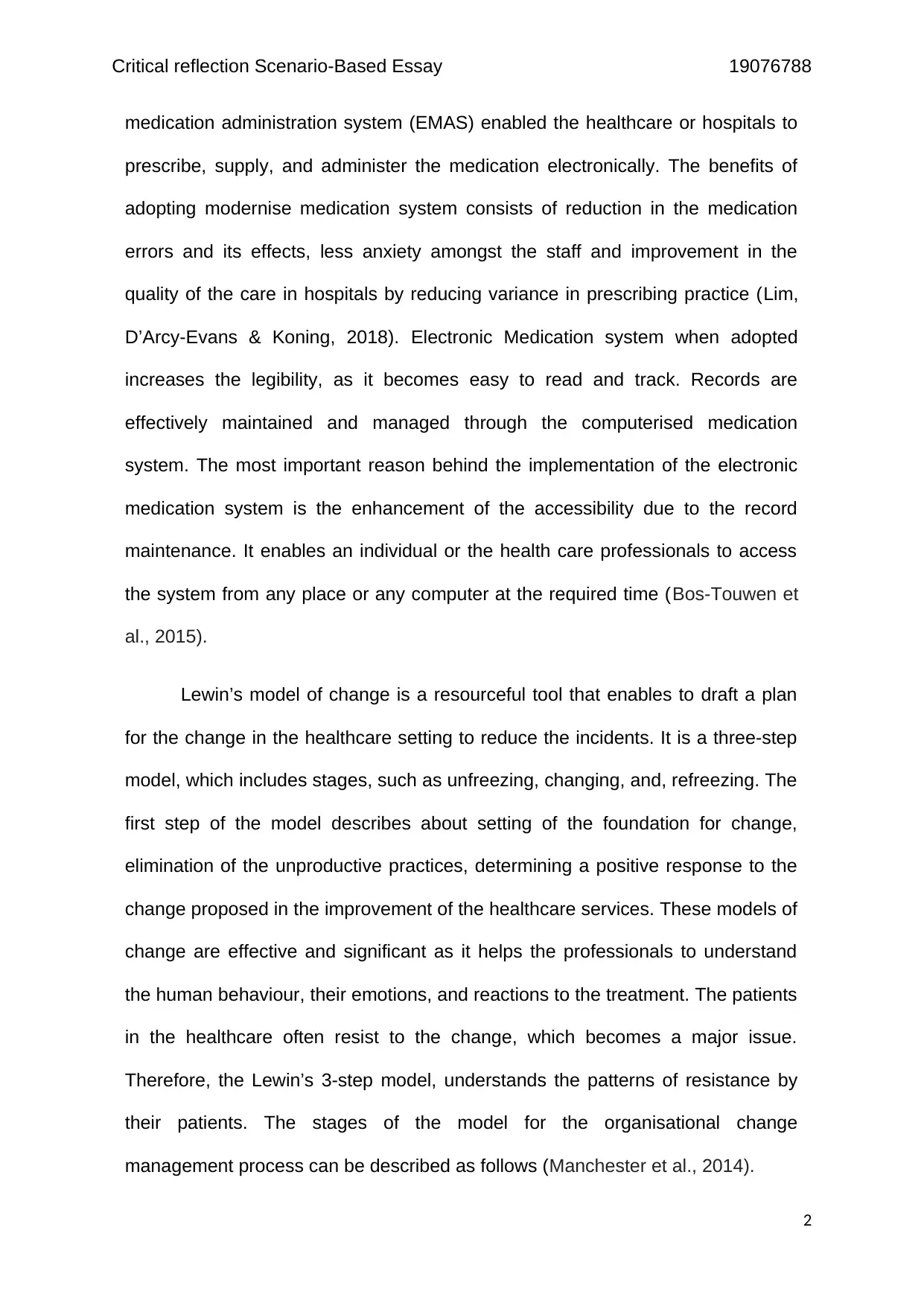
Critical reflection Scenario-Based Essay 19076788
medication administration system (EMAS) enabled the healthcare or hospitals to
prescribe, supply, and administer the medication electronically. The benefits of
adopting modernise medication system consists of reduction in the medication
errors and its effects, less anxiety amongst the staff and improvement in the
quality of the care in hospitals by reducing variance in prescribing practice (Lim,
D’Arcy-Evans & Koning, 2018). Electronic Medication system when adopted
increases the legibility, as it becomes easy to read and track. Records are
effectively maintained and managed through the computerised medication
system. The most important reason behind the implementation of the electronic
medication system is the enhancement of the accessibility due to the record
maintenance. It enables an individual or the health care professionals to access
the system from any place or any computer at the required time (Bos-Touwen et
al., 2015).
Lewin’s model of change is a resourceful tool that enables to draft a plan
for the change in the healthcare setting to reduce the incidents. It is a three-step
model, which includes stages, such as unfreezing, changing, and, refreezing. The
first step of the model describes about setting of the foundation for change,
elimination of the unproductive practices, determining a positive response to the
change proposed in the improvement of the healthcare services. These models of
change are effective and significant as it helps the professionals to understand
the human behaviour, their emotions, and reactions to the treatment. The patients
in the healthcare often resist to the change, which becomes a major issue.
Therefore, the Lewin’s 3-step model, understands the patterns of resistance by
their patients. The stages of the model for the organisational change
management process can be described as follows (Manchester et al., 2014).
2
medication administration system (EMAS) enabled the healthcare or hospitals to
prescribe, supply, and administer the medication electronically. The benefits of
adopting modernise medication system consists of reduction in the medication
errors and its effects, less anxiety amongst the staff and improvement in the
quality of the care in hospitals by reducing variance in prescribing practice (Lim,
D’Arcy-Evans & Koning, 2018). Electronic Medication system when adopted
increases the legibility, as it becomes easy to read and track. Records are
effectively maintained and managed through the computerised medication
system. The most important reason behind the implementation of the electronic
medication system is the enhancement of the accessibility due to the record
maintenance. It enables an individual or the health care professionals to access
the system from any place or any computer at the required time (Bos-Touwen et
al., 2015).
Lewin’s model of change is a resourceful tool that enables to draft a plan
for the change in the healthcare setting to reduce the incidents. It is a three-step
model, which includes stages, such as unfreezing, changing, and, refreezing. The
first step of the model describes about setting of the foundation for change,
elimination of the unproductive practices, determining a positive response to the
change proposed in the improvement of the healthcare services. These models of
change are effective and significant as it helps the professionals to understand
the human behaviour, their emotions, and reactions to the treatment. The patients
in the healthcare often resist to the change, which becomes a major issue.
Therefore, the Lewin’s 3-step model, understands the patterns of resistance by
their patients. The stages of the model for the organisational change
management process can be described as follows (Manchester et al., 2014).
2
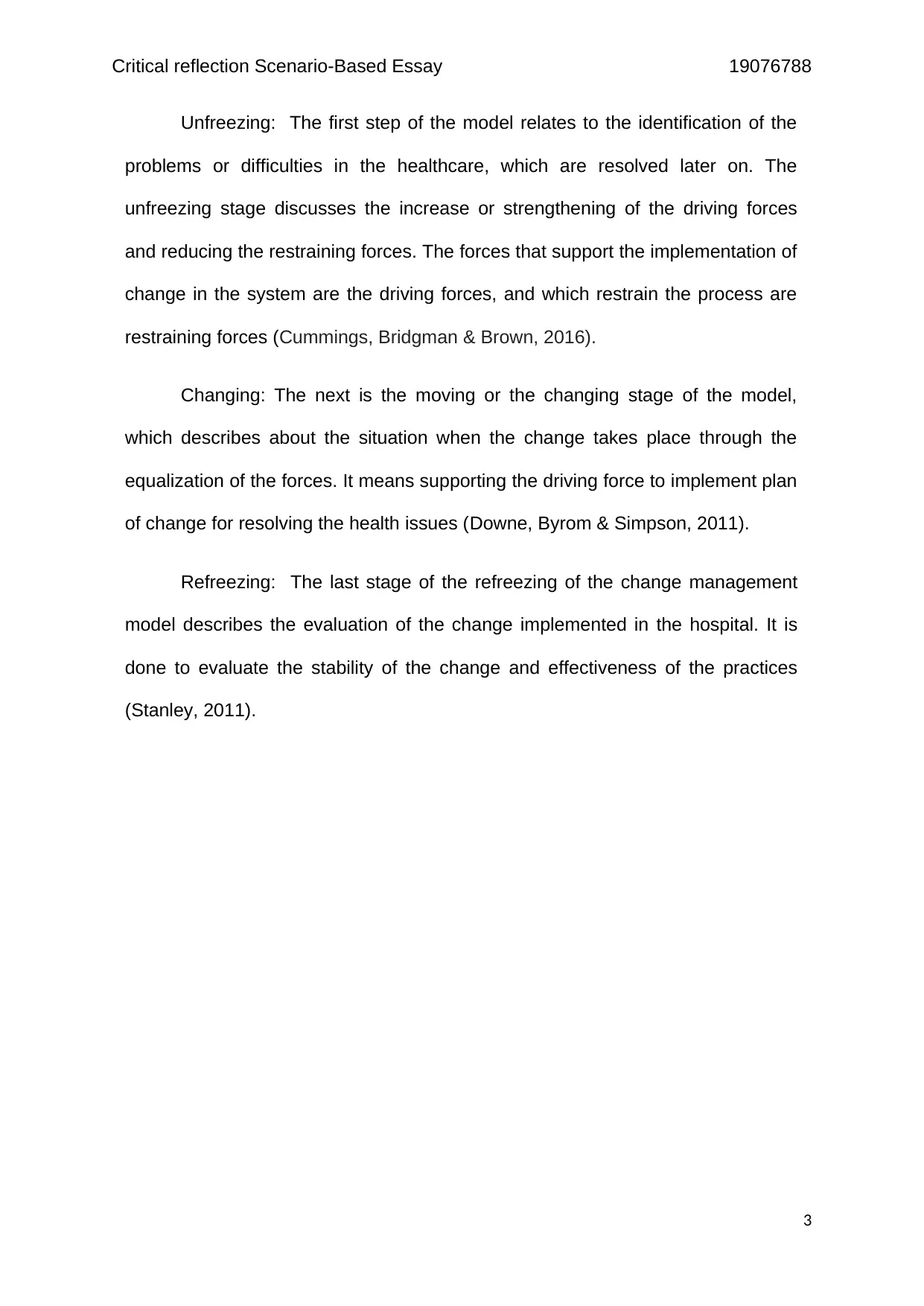
Critical reflection Scenario-Based Essay 19076788
Unfreezing: The first step of the model relates to the identification of the
problems or difficulties in the healthcare, which are resolved later on. The
unfreezing stage discusses the increase or strengthening of the driving forces
and reducing the restraining forces. The forces that support the implementation of
change in the system are the driving forces, and which restrain the process are
restraining forces (Cummings, Bridgman & Brown, 2016).
Changing: The next is the moving or the changing stage of the model,
which describes about the situation when the change takes place through the
equalization of the forces. It means supporting the driving force to implement plan
of change for resolving the health issues (Downe, Byrom & Simpson, 2011).
Refreezing: The last stage of the refreezing of the change management
model describes the evaluation of the change implemented in the hospital. It is
done to evaluate the stability of the change and effectiveness of the practices
(Stanley, 2011).
3
Unfreezing: The first step of the model relates to the identification of the
problems or difficulties in the healthcare, which are resolved later on. The
unfreezing stage discusses the increase or strengthening of the driving forces
and reducing the restraining forces. The forces that support the implementation of
change in the system are the driving forces, and which restrain the process are
restraining forces (Cummings, Bridgman & Brown, 2016).
Changing: The next is the moving or the changing stage of the model,
which describes about the situation when the change takes place through the
equalization of the forces. It means supporting the driving force to implement plan
of change for resolving the health issues (Downe, Byrom & Simpson, 2011).
Refreezing: The last stage of the refreezing of the change management
model describes the evaluation of the change implemented in the hospital. It is
done to evaluate the stability of the change and effectiveness of the practices
(Stanley, 2011).
3
⊘ This is a preview!⊘
Do you want full access?
Subscribe today to unlock all pages.

Trusted by 1+ million students worldwide
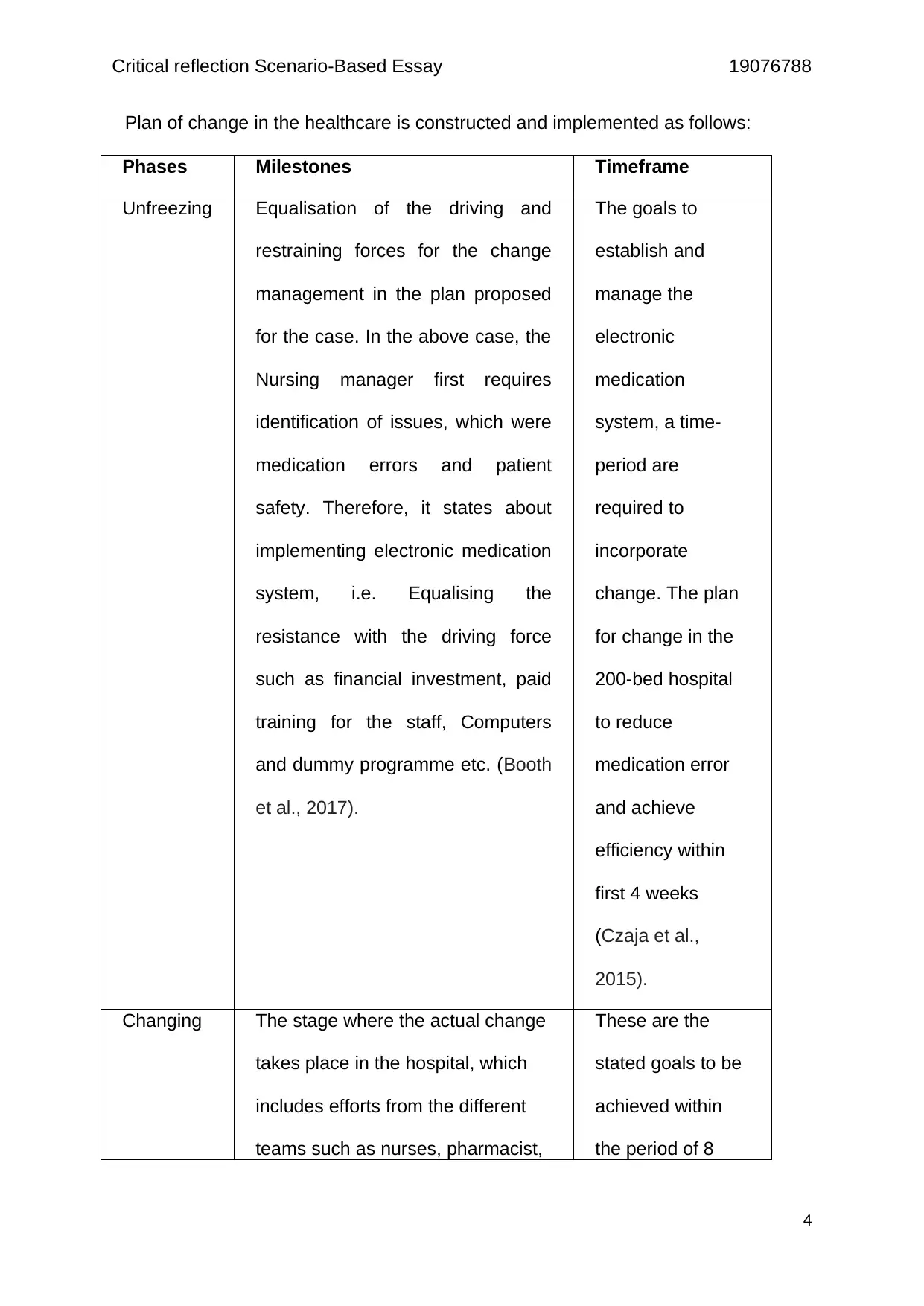
Critical reflection Scenario-Based Essay 19076788
Plan of change in the healthcare is constructed and implemented as follows:
Phases Milestones Timeframe
Unfreezing Equalisation of the driving and
restraining forces for the change
management in the plan proposed
for the case. In the above case, the
Nursing manager first requires
identification of issues, which were
medication errors and patient
safety. Therefore, it states about
implementing electronic medication
system, i.e. Equalising the
resistance with the driving force
such as financial investment, paid
training for the staff, Computers
and dummy programme etc. (Booth
et al., 2017).
The goals to
establish and
manage the
electronic
medication
system, a time-
period are
required to
incorporate
change. The plan
for change in the
200-bed hospital
to reduce
medication error
and achieve
efficiency within
first 4 weeks
(Czaja et al.,
2015).
Changing The stage where the actual change
takes place in the hospital, which
includes efforts from the different
teams such as nurses, pharmacist,
These are the
stated goals to be
achieved within
the period of 8
4
Plan of change in the healthcare is constructed and implemented as follows:
Phases Milestones Timeframe
Unfreezing Equalisation of the driving and
restraining forces for the change
management in the plan proposed
for the case. In the above case, the
Nursing manager first requires
identification of issues, which were
medication errors and patient
safety. Therefore, it states about
implementing electronic medication
system, i.e. Equalising the
resistance with the driving force
such as financial investment, paid
training for the staff, Computers
and dummy programme etc. (Booth
et al., 2017).
The goals to
establish and
manage the
electronic
medication
system, a time-
period are
required to
incorporate
change. The plan
for change in the
200-bed hospital
to reduce
medication error
and achieve
efficiency within
first 4 weeks
(Czaja et al.,
2015).
Changing The stage where the actual change
takes place in the hospital, which
includes efforts from the different
teams such as nurses, pharmacist,
These are the
stated goals to be
achieved within
the period of 8
4
Paraphrase This Document
Need a fresh take? Get an instant paraphrase of this document with our AI Paraphraser
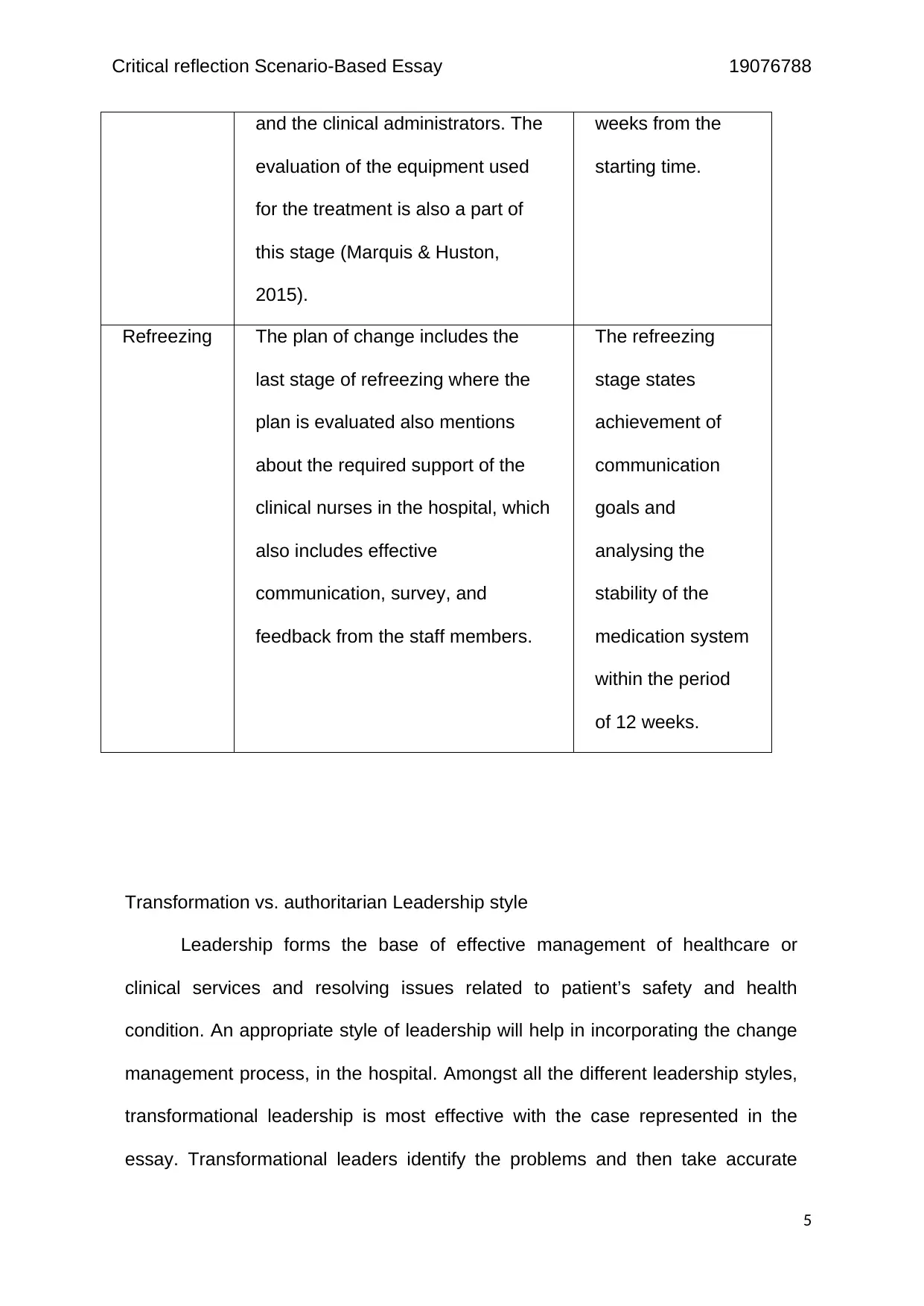
Critical reflection Scenario-Based Essay 19076788
and the clinical administrators. The
evaluation of the equipment used
for the treatment is also a part of
this stage (Marquis & Huston,
2015).
weeks from the
starting time.
Refreezing The plan of change includes the
last stage of refreezing where the
plan is evaluated also mentions
about the required support of the
clinical nurses in the hospital, which
also includes effective
communication, survey, and
feedback from the staff members.
The refreezing
stage states
achievement of
communication
goals and
analysing the
stability of the
medication system
within the period
of 12 weeks.
Transformation vs. authoritarian Leadership style
Leadership forms the base of effective management of healthcare or
clinical services and resolving issues related to patient’s safety and health
condition. An appropriate style of leadership will help in incorporating the change
management process, in the hospital. Amongst all the different leadership styles,
transformational leadership is most effective with the case represented in the
essay. Transformational leaders identify the problems and then take accurate
5
and the clinical administrators. The
evaluation of the equipment used
for the treatment is also a part of
this stage (Marquis & Huston,
2015).
weeks from the
starting time.
Refreezing The plan of change includes the
last stage of refreezing where the
plan is evaluated also mentions
about the required support of the
clinical nurses in the hospital, which
also includes effective
communication, survey, and
feedback from the staff members.
The refreezing
stage states
achievement of
communication
goals and
analysing the
stability of the
medication system
within the period
of 12 weeks.
Transformation vs. authoritarian Leadership style
Leadership forms the base of effective management of healthcare or
clinical services and resolving issues related to patient’s safety and health
condition. An appropriate style of leadership will help in incorporating the change
management process, in the hospital. Amongst all the different leadership styles,
transformational leadership is most effective with the case represented in the
essay. Transformational leaders identify the problems and then take accurate
5
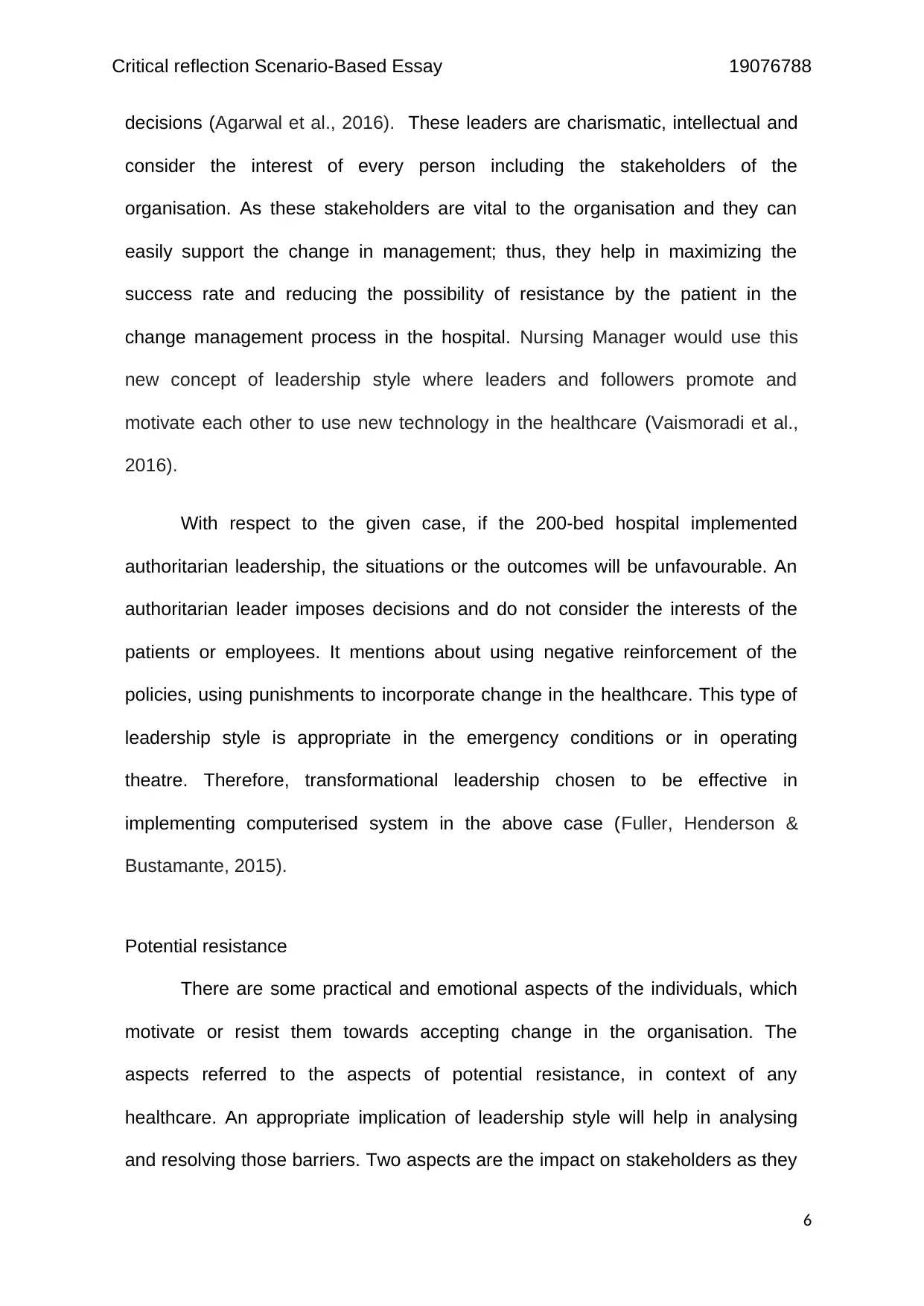
Critical reflection Scenario-Based Essay 19076788
decisions (Agarwal et al., 2016). These leaders are charismatic, intellectual and
consider the interest of every person including the stakeholders of the
organisation. As these stakeholders are vital to the organisation and they can
easily support the change in management; thus, they help in maximizing the
success rate and reducing the possibility of resistance by the patient in the
change management process in the hospital. Nursing Manager would use this
new concept of leadership style where leaders and followers promote and
motivate each other to use new technology in the healthcare (Vaismoradi et al.,
2016).
With respect to the given case, if the 200-bed hospital implemented
authoritarian leadership, the situations or the outcomes will be unfavourable. An
authoritarian leader imposes decisions and do not consider the interests of the
patients or employees. It mentions about using negative reinforcement of the
policies, using punishments to incorporate change in the healthcare. This type of
leadership style is appropriate in the emergency conditions or in operating
theatre. Therefore, transformational leadership chosen to be effective in
implementing computerised system in the above case (Fuller, Henderson &
Bustamante, 2015).
Potential resistance
There are some practical and emotional aspects of the individuals, which
motivate or resist them towards accepting change in the organisation. The
aspects referred to the aspects of potential resistance, in context of any
healthcare. An appropriate implication of leadership style will help in analysing
and resolving those barriers. Two aspects are the impact on stakeholders as they
6
decisions (Agarwal et al., 2016). These leaders are charismatic, intellectual and
consider the interest of every person including the stakeholders of the
organisation. As these stakeholders are vital to the organisation and they can
easily support the change in management; thus, they help in maximizing the
success rate and reducing the possibility of resistance by the patient in the
change management process in the hospital. Nursing Manager would use this
new concept of leadership style where leaders and followers promote and
motivate each other to use new technology in the healthcare (Vaismoradi et al.,
2016).
With respect to the given case, if the 200-bed hospital implemented
authoritarian leadership, the situations or the outcomes will be unfavourable. An
authoritarian leader imposes decisions and do not consider the interests of the
patients or employees. It mentions about using negative reinforcement of the
policies, using punishments to incorporate change in the healthcare. This type of
leadership style is appropriate in the emergency conditions or in operating
theatre. Therefore, transformational leadership chosen to be effective in
implementing computerised system in the above case (Fuller, Henderson &
Bustamante, 2015).
Potential resistance
There are some practical and emotional aspects of the individuals, which
motivate or resist them towards accepting change in the organisation. The
aspects referred to the aspects of potential resistance, in context of any
healthcare. An appropriate implication of leadership style will help in analysing
and resolving those barriers. Two aspects are the impact on stakeholders as they
6
⊘ This is a preview!⊘
Do you want full access?
Subscribe today to unlock all pages.

Trusted by 1+ million students worldwide
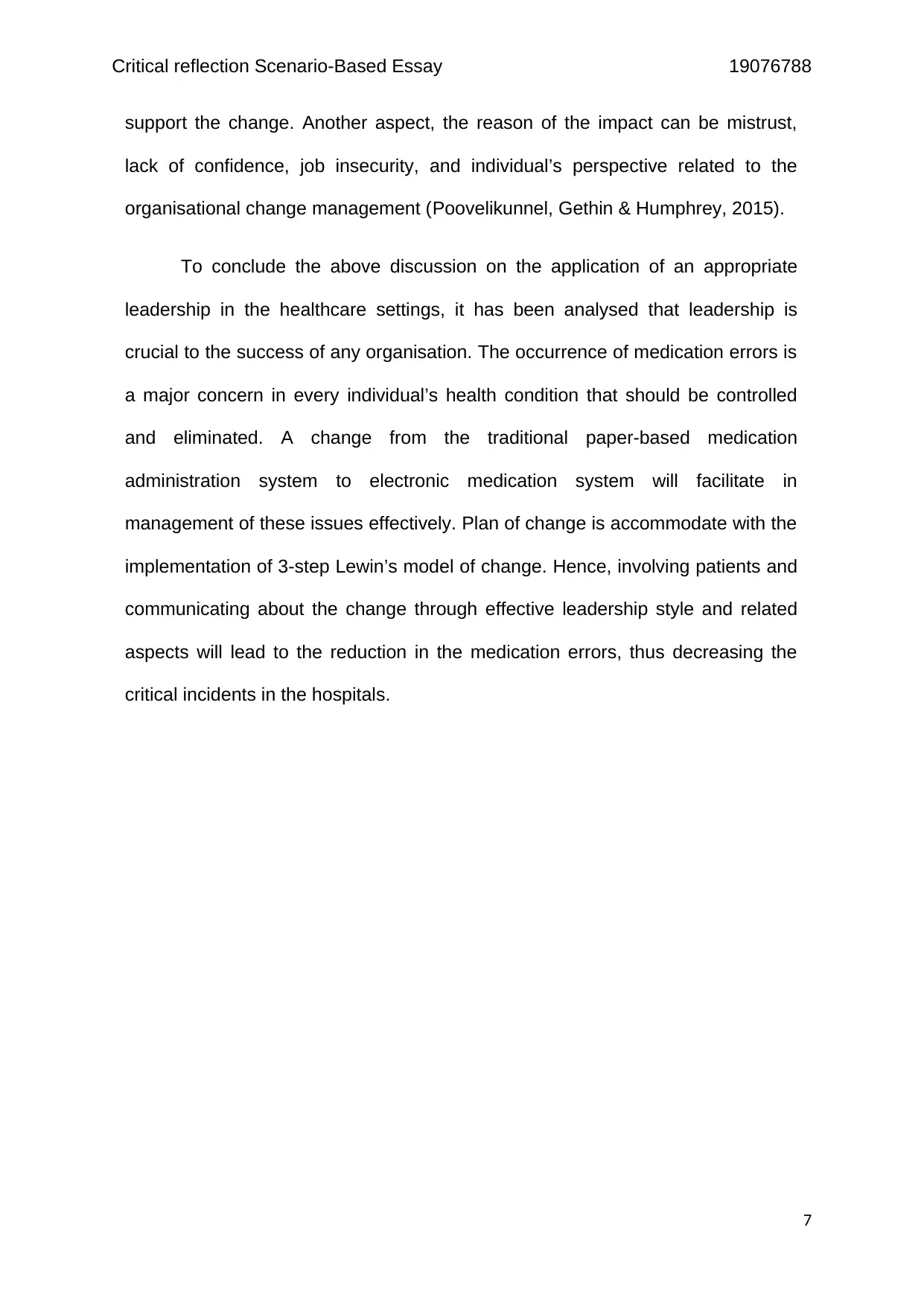
Critical reflection Scenario-Based Essay 19076788
support the change. Another aspect, the reason of the impact can be mistrust,
lack of confidence, job insecurity, and individual’s perspective related to the
organisational change management (Poovelikunnel, Gethin & Humphrey, 2015).
To conclude the above discussion on the application of an appropriate
leadership in the healthcare settings, it has been analysed that leadership is
crucial to the success of any organisation. The occurrence of medication errors is
a major concern in every individual’s health condition that should be controlled
and eliminated. A change from the traditional paper-based medication
administration system to electronic medication system will facilitate in
management of these issues effectively. Plan of change is accommodate with the
implementation of 3-step Lewin’s model of change. Hence, involving patients and
communicating about the change through effective leadership style and related
aspects will lead to the reduction in the medication errors, thus decreasing the
critical incidents in the hospitals.
7
support the change. Another aspect, the reason of the impact can be mistrust,
lack of confidence, job insecurity, and individual’s perspective related to the
organisational change management (Poovelikunnel, Gethin & Humphrey, 2015).
To conclude the above discussion on the application of an appropriate
leadership in the healthcare settings, it has been analysed that leadership is
crucial to the success of any organisation. The occurrence of medication errors is
a major concern in every individual’s health condition that should be controlled
and eliminated. A change from the traditional paper-based medication
administration system to electronic medication system will facilitate in
management of these issues effectively. Plan of change is accommodate with the
implementation of 3-step Lewin’s model of change. Hence, involving patients and
communicating about the change through effective leadership style and related
aspects will lead to the reduction in the medication errors, thus decreasing the
critical incidents in the hospitals.
7
Paraphrase This Document
Need a fresh take? Get an instant paraphrase of this document with our AI Paraphraser
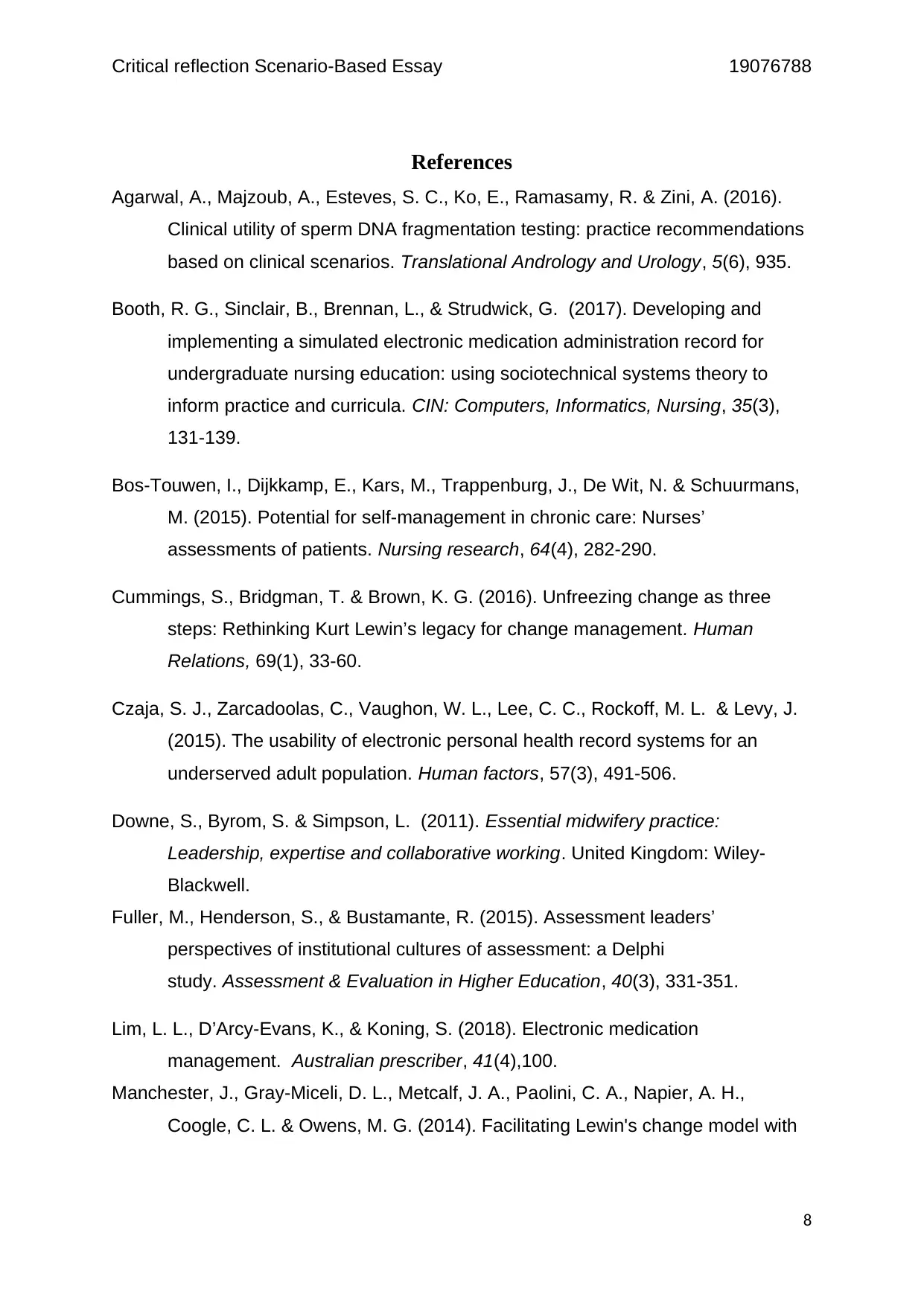
Critical reflection Scenario-Based Essay 19076788
References
Agarwal, A., Majzoub, A., Esteves, S. C., Ko, E., Ramasamy, R. & Zini, A. (2016).
Clinical utility of sperm DNA fragmentation testing: practice recommendations
based on clinical scenarios. Translational Andrology and Urology, 5(6), 935.
Booth, R. G., Sinclair, B., Brennan, L., & Strudwick, G. (2017). Developing and
implementing a simulated electronic medication administration record for
undergraduate nursing education: using sociotechnical systems theory to
inform practice and curricula. CIN: Computers, Informatics, Nursing, 35(3),
131-139.
Bos-Touwen, I., Dijkkamp, E., Kars, M., Trappenburg, J., De Wit, N. & Schuurmans,
M. (2015). Potential for self-management in chronic care: Nurses’
assessments of patients. Nursing research, 64(4), 282-290.
Cummings, S., Bridgman, T. & Brown, K. G. (2016). Unfreezing change as three
steps: Rethinking Kurt Lewin’s legacy for change management. Human
Relations, 69(1), 33-60.
Czaja, S. J., Zarcadoolas, C., Vaughon, W. L., Lee, C. C., Rockoff, M. L. & Levy, J.
(2015). The usability of electronic personal health record systems for an
underserved adult population. Human factors, 57(3), 491-506.
Downe, S., Byrom, S. & Simpson, L. (2011). Essential midwifery practice:
Leadership, expertise and collaborative working. United Kingdom: Wiley-
Blackwell.
Fuller, M., Henderson, S., & Bustamante, R. (2015). Assessment leaders’
perspectives of institutional cultures of assessment: a Delphi
study. Assessment & Evaluation in Higher Education, 40(3), 331-351.
Lim, L. L., D’Arcy-Evans, K., & Koning, S. (2018). Electronic medication
management. Australian prescriber, 41(4),100.
Manchester, J., Gray-Miceli, D. L., Metcalf, J. A., Paolini, C. A., Napier, A. H.,
Coogle, C. L. & Owens, M. G. (2014). Facilitating Lewin's change model with
8
References
Agarwal, A., Majzoub, A., Esteves, S. C., Ko, E., Ramasamy, R. & Zini, A. (2016).
Clinical utility of sperm DNA fragmentation testing: practice recommendations
based on clinical scenarios. Translational Andrology and Urology, 5(6), 935.
Booth, R. G., Sinclair, B., Brennan, L., & Strudwick, G. (2017). Developing and
implementing a simulated electronic medication administration record for
undergraduate nursing education: using sociotechnical systems theory to
inform practice and curricula. CIN: Computers, Informatics, Nursing, 35(3),
131-139.
Bos-Touwen, I., Dijkkamp, E., Kars, M., Trappenburg, J., De Wit, N. & Schuurmans,
M. (2015). Potential for self-management in chronic care: Nurses’
assessments of patients. Nursing research, 64(4), 282-290.
Cummings, S., Bridgman, T. & Brown, K. G. (2016). Unfreezing change as three
steps: Rethinking Kurt Lewin’s legacy for change management. Human
Relations, 69(1), 33-60.
Czaja, S. J., Zarcadoolas, C., Vaughon, W. L., Lee, C. C., Rockoff, M. L. & Levy, J.
(2015). The usability of electronic personal health record systems for an
underserved adult population. Human factors, 57(3), 491-506.
Downe, S., Byrom, S. & Simpson, L. (2011). Essential midwifery practice:
Leadership, expertise and collaborative working. United Kingdom: Wiley-
Blackwell.
Fuller, M., Henderson, S., & Bustamante, R. (2015). Assessment leaders’
perspectives of institutional cultures of assessment: a Delphi
study. Assessment & Evaluation in Higher Education, 40(3), 331-351.
Lim, L. L., D’Arcy-Evans, K., & Koning, S. (2018). Electronic medication
management. Australian prescriber, 41(4),100.
Manchester, J., Gray-Miceli, D. L., Metcalf, J. A., Paolini, C. A., Napier, A. H.,
Coogle, C. L. & Owens, M. G. (2014). Facilitating Lewin's change model with
8
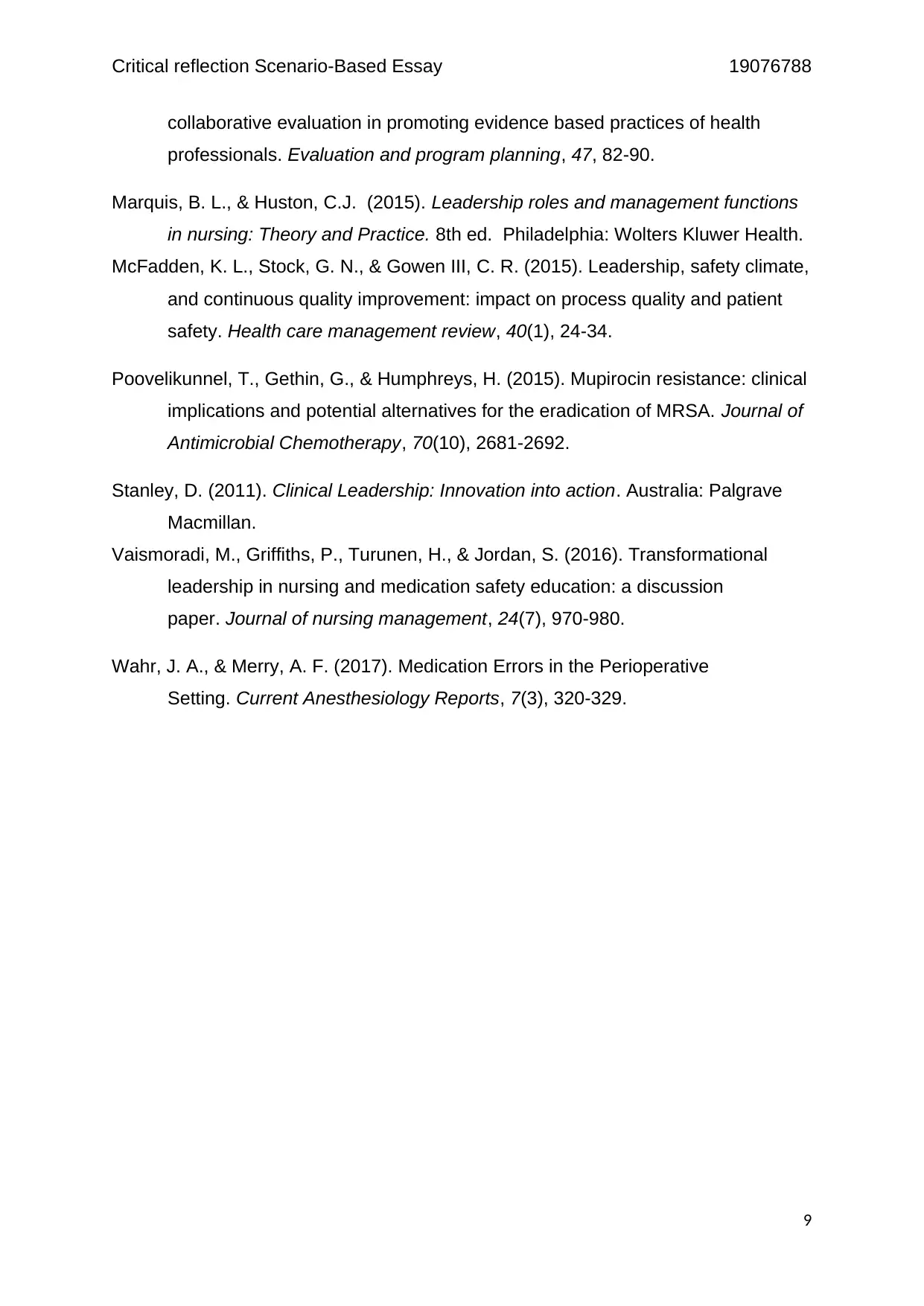
Critical reflection Scenario-Based Essay 19076788
collaborative evaluation in promoting evidence based practices of health
professionals. Evaluation and program planning, 47, 82-90.
Marquis, B. L., & Huston, C.J. (2015). Leadership roles and management functions
in nursing: Theory and Practice. 8th ed. Philadelphia: Wolters Kluwer Health.
McFadden, K. L., Stock, G. N., & Gowen III, C. R. (2015). Leadership, safety climate,
and continuous quality improvement: impact on process quality and patient
safety. Health care management review, 40(1), 24-34.
Poovelikunnel, T., Gethin, G., & Humphreys, H. (2015). Mupirocin resistance: clinical
implications and potential alternatives for the eradication of MRSA. Journal of
Antimicrobial Chemotherapy, 70(10), 2681-2692.
Stanley, D. (2011). Clinical Leadership: Innovation into action. Australia: Palgrave
Macmillan.
Vaismoradi, M., Griffiths, P., Turunen, H., & Jordan, S. (2016). Transformational
leadership in nursing and medication safety education: a discussion
paper. Journal of nursing management, 24(7), 970-980.
Wahr, J. A., & Merry, A. F. (2017). Medication Errors in the Perioperative
Setting. Current Anesthesiology Reports, 7(3), 320-329.
9
collaborative evaluation in promoting evidence based practices of health
professionals. Evaluation and program planning, 47, 82-90.
Marquis, B. L., & Huston, C.J. (2015). Leadership roles and management functions
in nursing: Theory and Practice. 8th ed. Philadelphia: Wolters Kluwer Health.
McFadden, K. L., Stock, G. N., & Gowen III, C. R. (2015). Leadership, safety climate,
and continuous quality improvement: impact on process quality and patient
safety. Health care management review, 40(1), 24-34.
Poovelikunnel, T., Gethin, G., & Humphreys, H. (2015). Mupirocin resistance: clinical
implications and potential alternatives for the eradication of MRSA. Journal of
Antimicrobial Chemotherapy, 70(10), 2681-2692.
Stanley, D. (2011). Clinical Leadership: Innovation into action. Australia: Palgrave
Macmillan.
Vaismoradi, M., Griffiths, P., Turunen, H., & Jordan, S. (2016). Transformational
leadership in nursing and medication safety education: a discussion
paper. Journal of nursing management, 24(7), 970-980.
Wahr, J. A., & Merry, A. F. (2017). Medication Errors in the Perioperative
Setting. Current Anesthesiology Reports, 7(3), 320-329.
9
⊘ This is a preview!⊘
Do you want full access?
Subscribe today to unlock all pages.

Trusted by 1+ million students worldwide
1 out of 9
Related Documents
Your All-in-One AI-Powered Toolkit for Academic Success.
+13062052269
info@desklib.com
Available 24*7 on WhatsApp / Email
![[object Object]](/_next/static/media/star-bottom.7253800d.svg)
Unlock your academic potential
Copyright © 2020–2026 A2Z Services. All Rights Reserved. Developed and managed by ZUCOL.





